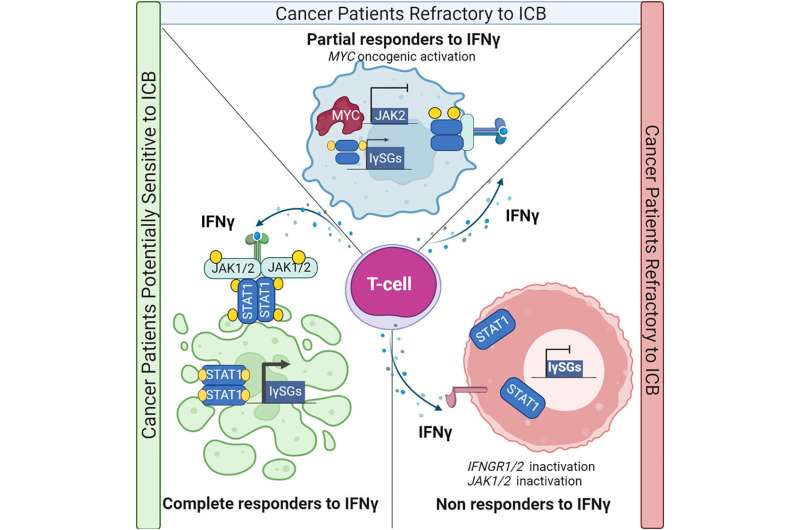This article has been reviewed according to Science X's editorial process and policies. Editors have highlighted the following attributes while ensuring the content's credibility:
fact-checked
peer-reviewed publication
trusted source
proofread
Researchers find out why some lung tumors avoid immunotherapy, and learn how to predict this in advance

The oncogenic activation of MYC, a critical gene in cancer progression, has the potential to identify lung cancer patients who may respond poorly to immunotherapy (ICB). This is the main conclusion of a study recently published in Cell Reports Medicine by a team of researchers led by Dr. Montse Sanchez-Cespedes, principal investigator of the Cancer Genetics group at the Josep Carreras Leukemia Research Institute. Their findings highlight a major contributor to poor response and suggest a new approach to selecting patients who will benefit from ICB or require alternative treatments well in advance.
ICB therapy, which stands for immune checkpoint blockade, has become the standard treatment for lung cancer due to its generally positive outcomes. Thus far, high levels of the PD-L1 protein have been the primary means of predicting a positive treatment response. However, many lung cancer tumors have inherently high levels of this protein and still fail to respond to ICB, while others with low levels of the very same protein do respond. Identifying which patients will respond strongly in advance could save valuable time and help patients live longer and healthier lives.
The ICB treatments inhibit the action of PD-L1 and its partner PD1, to increase the action of the immune system against the tumor cells. These two proteins are part of a natural system to avoid autoimmunity, with PD-L1 being typically present in the membrane of the cells (including cancer cells) and, through the interaction with its partner PD-1, present in immune cells, prevent an overaction of the immune system that can be detrimental for the organism. In the context of a tumor, this results in the immune system not killing cancer cells, hence why the ICB treatment attempts to block this contact.
On the other hand, tumors are found with low levels of PD-L1. Without this immune-limiting trick, how are they avoiding a strong immune attack? In their recent publication in the journal Cell Reports Medicine, the team led by Dr. Sanchez-Cespedes reports that many of the tumors with low PD-L1 have developed genetic strategies that avoid the action of the gamma interferon against the tumor cells. The gamma interferon is a powerful stimulator of the immune response secreted by immune cells and, avoiding its action, the tumor cells cannot be killed by the immune system.
One of these genetic strategies found in tumor cells is the activation of the oncogene MYC, which leads to a cascade of events that prevent the action of the gamma interferon inside the cell. Experimental results show that this could be a strong and reliable predictor of response to ICB in cancer patients, as tumors with MYC genetic activation are associated with a poorer prognosis after treatment with ICBs.
The new findings reported might inspire new clinical trials to assess whether MYC status can be a better marker than PD-L1 abundance to select patients for ICB or similar treatments and make a difference in the clinical management of lung cancer in the near future.
More information: Juan J. Alburquerque-Bejar et al, MYC activation impairs cell-intrinsic IFNγ signaling and confers resistance to anti-PD1/PD-L1 therapy in lung cancer, Cell Reports Medicine (2023). DOI: 10.1016/j.xcrm.2023.101006




















